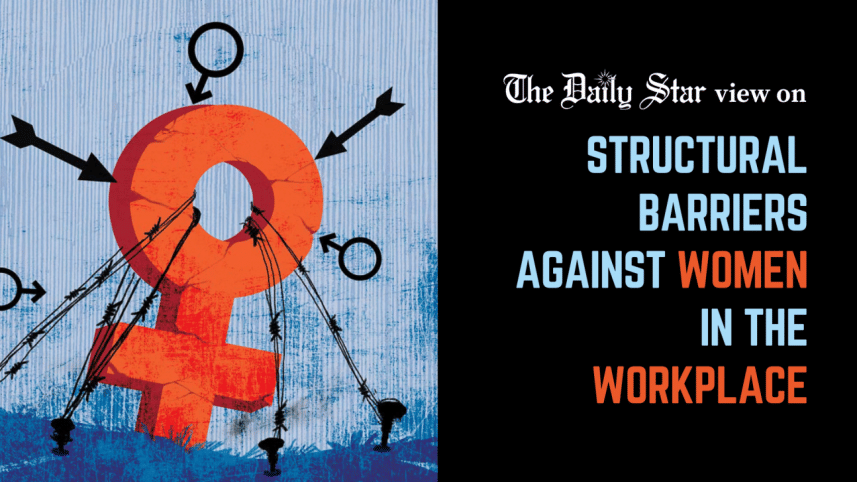We must break the glass ceiling, for our own sake

As we celebrate the International Women's Day today, we must do so with the sombre realisation that, despite the visible advancements of women over the past decades, there is still a long way to go before equality becomes a lived reality for women rather than an abstract ideal. Women still face significant structural barriers in accessing and exercising their rights guaranteed by the constitution, as well as constantly confronting entrenched patriarchal values as they navigate their personal and professional lives.
According to a recent report by the World Bank, titled "Women, Business and Law 2024," women in Bangladesh enjoy only one-third of the legal rights enjoyed by men in the workplace. The report—which scores nations based on 10 indicators, including mobility, workplace, pay, marriage, parenthood, entrepreneurship, assets, pension, safety, and childcare—places Bangladesh, with a score of 49.4, at the bottom among South Asian countries, with only Afghanistan behind. The report also highlights a significant pay gap between men and women, with Bangladesh scoring only 25 out of 100 on that indicator. The statistics, though sobering in their gravity, are not altogether shocking, given the horde of issues holding women back including lack of familial support, workplace biases, inadequate childcare and maternity benefits, sexual harassment, and so on.
Despite women and girls outnumbering and outperforming men in education, our workplaces, for the most part, remain male-dominated. Take the banking sector, for example, where only 16 percent of women are employed. Deep-rooted and unacknowledged prejudices of employers and managers towards female recruits when it comes to work distribution, promotions or other benefits are all too common, no matter the sector. In additional to institutional biases, women also have to disproportionately bear the brunt of childcare and domestic work compared to their partners, leaving them juggling—and at times failing to balance—their familial and professional duties, in the absence of proper childcare facilities at their workplaces. The ubiquity of sexual violence, be it in the family, workplace or public sphere, remains another major obstacle to women's true emancipation.
This year's Women's Day theme, "invest in women," should not be taken lightly. Our workplaces must become more gender-sensitive if we are to bridge these stark inequalities, beginning with ensuring proper and well-staffed childcare facilities, redress for sexual harassment in the workplace, and maternity leave and benefits. We must guarantee more women in leadership positions. If we are to truly progress as a nation, we cannot do so by leaving behind half of our population to fight the uphill battle against patriarchy and institutional sexism on their own.



 For all latest news, follow The Daily Star's Google News channel.
For all latest news, follow The Daily Star's Google News channel. 


Comments